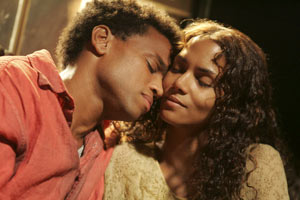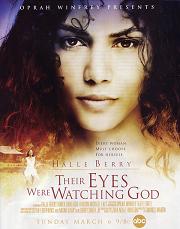FILM NOTES
FILM NOTES INDEX
NYS WRITERS INSTITUTE
HOME PAGE

Directed by Darnell Martin
(United States, 2005, 98 minutes, color, DVD)
Adapted by Pulitzer Prize-winning Playwright Suzan-Lori Parks
Starring:
Halle Berry . . . . . . . . . . Janie Crawford
Michael Ealy . . . . . . . . . . Teacake
Logan Killicks . . . . . . . . . . Jody Starks
Ruben Santiago-Hudson . . . . . . . . . . Mayor Joe Starks
Lucy Anne Hurston will provide film commentary and answer questions immediately following the screening.
Along with Samuel Clemens' Huckleberry Finn, Fitzgerald's The Great Gatsby, and Harper Lee's To Kill a Mockingbird, Zora Neale Hurston's Their Eyes Were Watching God is surely one of the most American of great novels. It is a story rooted in the red dust of the Florida outback of the 1930's; its heroine, the sensual and introspective Janie Crawford, tells her friend Pheby of her three lovers, the stolid Logan Killicks, the fast-talking Jody Starks, and finally, the handsome and endearing Teacake. Her life with Teacake ends in an agonizing choice that forces Janie (and the reader) to wonder if the secure self-hood and love she had won was worth the suffering it exacted. In language that managed to be languid yet urgent with all the possibilities of physical as well as spiritual love, Their Eyes Were Watching God moves like a cool stream through a hot palmetto swamp, a journey of the heart and a woman's awakening whose universal power has remained undimmed in the 70 years since its first publication. It is no exaggeration to say that it has deeply influenced every African American woman narrative artist, from novelists like Toni Morrison to filmmakers like Julie Dash.
But it took a long time for the book to gather its strength. Like James Agee's Let Us Now Praise Famous Men, another great work of an emotional awakening in the Deep South published in the same decade, Their Eyes Were Watching God confused, even angered critics upon its release. (Among the most ambivalent were some African American critics, who criticized the book for its use of Black vernacular English.) A novel built around the emotional and sexual maturing of a Black female character simply fractured too many social paradigms. The book did not sell well, and the world would wait for 1940's Native Son, itself a shattering work, before a young Black novelist would achieve notoriety across the color line. Hurston, a Renaissance woman who also produced memoirs, folklore, essays, short stories, drama, and other writing, fought to find a place for herself in American literary circles. She died in 1960, after working in a library and as a substitute teacher. Her literary legacy remained tragically obscure until the 1970's, when Alice Walker began to write of Hurston. When Hurston's grave was finally marked in 1974, the event was symbolic of a rebirth of interest in this extraordinary novel. It's place as essential American reading is now secure, and it has become a literary bestseller, a success driven by its presence on countless high school and college reading lists. At long last, Hurston has a central place in the American literary pantheon.
 To an extent, it is precisely this late, hard-won reputation as a masterwork that has made Their Eyes Were Watching God untouchable as a movie property; canonized as one of the fountainheads of African American literature, its adaptation to film has daunted prospective writers and producers. Oprah Winfrey, one of the book's millions of enraptured readers, was determined to bring it to the screen as the crowning achievement of her ambitious project in Black literary and cinematic culture. That project had already seen her produce The Women of Brewster Place, and perform in two other significant adaptations of Black novels, the films The Color Purple and Native Son. The morning after actress Halle Berry won her 2002 Best Actress Academy Award, Winfrey said, she called her, eager to lock up Berry for the role of Janie. Winfrey's and Berry's names made this one of the most prestigious of television films. Director Darnell Martin was recruited from series television, screenwriter/playwright Suzan-Lori Parks set to work, and a cast was built around Berry and Michael Ealy as Teacake. (And Ruby Dee, the actress who, in an earlier day, would have been exquisite as Janie, as Janie's grandmother.)
To an extent, it is precisely this late, hard-won reputation as a masterwork that has made Their Eyes Were Watching God untouchable as a movie property; canonized as one of the fountainheads of African American literature, its adaptation to film has daunted prospective writers and producers. Oprah Winfrey, one of the book's millions of enraptured readers, was determined to bring it to the screen as the crowning achievement of her ambitious project in Black literary and cinematic culture. That project had already seen her produce The Women of Brewster Place, and perform in two other significant adaptations of Black novels, the films The Color Purple and Native Son. The morning after actress Halle Berry won her 2002 Best Actress Academy Award, Winfrey said, she called her, eager to lock up Berry for the role of Janie. Winfrey's and Berry's names made this one of the most prestigious of television films. Director Darnell Martin was recruited from series television, screenwriter/playwright Suzan-Lori Parks set to work, and a cast was built around Berry and Michael Ealy as Teacake. (And Ruby Dee, the actress who, in an earlier day, would have been exquisite as Janie, as Janie's grandmother.)
What resulted is a respectful and engaged adaptation of a central work of America fiction. The front-porch society of Hurston's Eatonville has finally come to life on the screen. Berry's performance is one of size and quality, as befits the character who has outlived her broken-hearted creator to become the fictional protagonist of the African American female experience.
— Kevin Hagopian, Penn State University
For additional information, contact the Writers Institute at 518-442-5620 or online at https://www.albany.edu/writers-inst.
 Their Were Watching God
Their Were Watching God